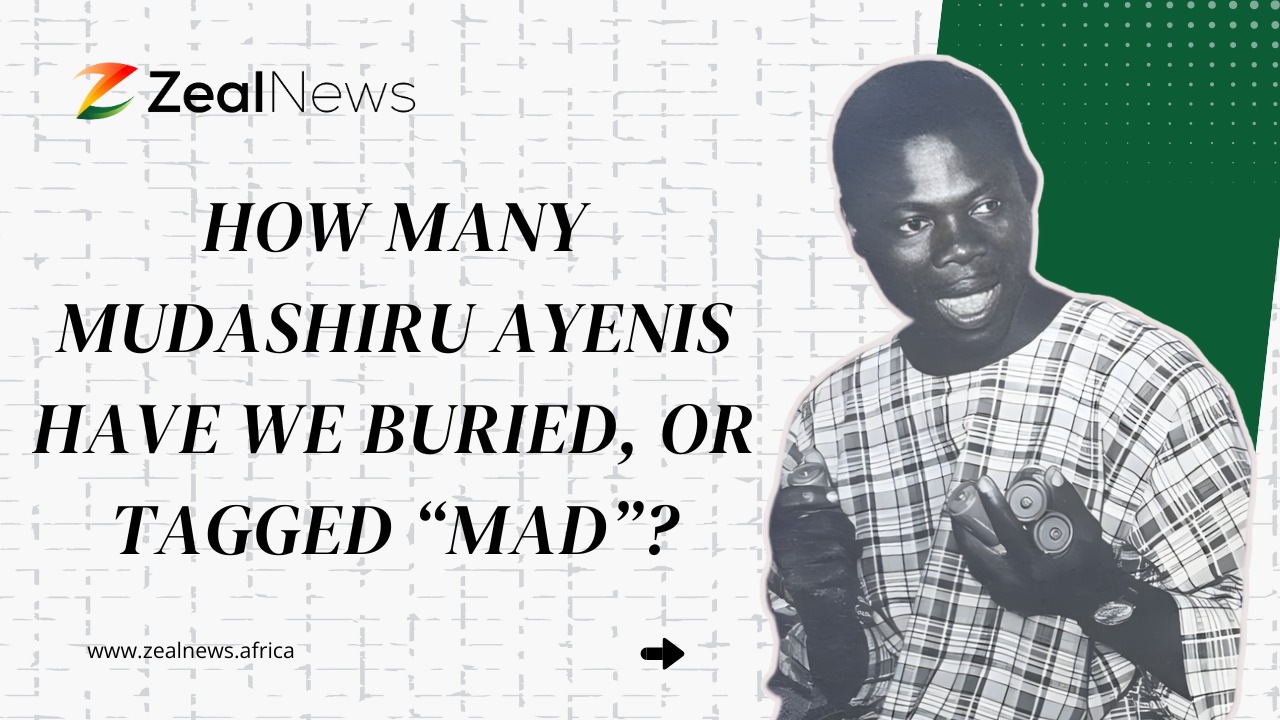OPINION: Are African Parents Ready for Gen Z?

“These Children of Nowadays…”
If you’ve ever sat through a family gathering in an African household, you’ve heard that phrase. It usually precedes a complaint: “They talk back,” “They’re too sensitive,” “They don’t respect tradition,” or the classic — “They’re always on their phones.”
Welcome to the generational gap — African edition.
Across the continent and beyond, Gen Z (roughly those born between 1997 and 2012) is coming of age. They’re loud, online, globally connected, and politically aware. They’re also the generation most likely to question authority, speak up about mental health, and reject cultural norms that no longer serve them.
And yet, many African parents are stuck trying to raise them with tools they used in the 1980s.
So we ask: Are African parents truly ready for Gen Z? Or are they parenting a new world with an old map?
Who Is Gen Z in Africa, Really?
To understand the tension, we must understand the players.
African Gen Zs are hyper-digital — many grew up with smartphones, YouTube, and TikTok as their playgrounds. They are entrepreneurial — often creating side hustles in their teens. They’re global in outlook, but fiercely local in identity. They speak in memes, slang, and emojis. But more importantly, they are coming of age in a time of:
Digital activism and online freedom
According to a 2022 UNICEF report, African Gen Zs are also the most connected and socially engaged generation the continent has ever seen.

What African Parents Expect vs. What Gen Z Is
The expectations many African parents hold often clash with the reality of who Gen Z is. Here’s how:
Respect: For most African parents, respect means obedience without question. For Gen Z, respect is more mutual — it means being heard and treated as an individual.
Career Choices: Parents often expect their children to pursue traditional “safe” careers like medicine, law, engineering, or banking. Gen Z sees career as self-expression — tech, arts, digital content, and entrepreneurship are legitimate paths.
Silence: Silence is often praised as good behavior by older generations. But for Gen Z, silence can mean suppression — they equate speaking out with emotional honesty and mental health awareness.
Religion: Religion used to be non-negotiable in many homes — everyone prayed the same way. For Gen Z, faith is a personal journey — explored, questioned, and sometimes redefined.
Sexuality and Gender: Conversations around sex and gender are still considered taboo in many households. For Gen Z, they are open discussions about identity, consent, and mental well-being.
Authority: African parents often expect to be the final authority, unquestioned. Gen Z was raised on the internet — they believe authority should be accountable and earned, not automatic (Harvard).
This widening gap in values isn’t necessarily a rebellion — it’s a reflection of changing times, environments, and levels of exposure.
When Culture Collides with Communication
In traditional African homes, conversations often flow one way — from parent to child. Questioning an elder is considered disrespectful. But Gen Z grew up in comment sections, group chats, and Reddit forums. Their world thrives on dialogue.
This creates a culture clash. A 2023 Afrobarometer survey found that while 78% of African parents value obedience and discipline in youth, only 32% of Gen Z respondents saw obedience as a top value — they listed “freedom” and “self-expression” first.
It’s not disrespect. It’s generational trauma meeting emotional intelligence.
Mental Health: The Elephant in the Living Room
Gen Z is the first African generation to speak openly about mental health. Depression, anxiety, burnout — these are not foreign concepts. They’re real, lived experiences.
But in many African households, mental health is still misunderstood. It’s often dismissed as:
Laziness
“Spiritual attack”
Lack of prayer
Western nonsense
A 2024 WHO Africa report showed a 36% rise in depression and anxiety symptoms among African youth — but access to support systems remains dismal, and stigma persists.
This is where the parenting gap becomes dangerous. Emotional neglect is not tradition. It’s trauma (The Conversation).
Career Expectations: Doctor, Lawyer… or Disappointment?
“Creative ke? Is everything alright?”
This is the response many African Gen Zs hear when they express interest in pursuing art, music, gaming, or digital content. Parents, often raised on survival and structure, prefer careers with perceived stability: law, engineering, medicine, banking.
But Gen Z is rewriting the script:
They’re earning on Upwork and TikTok
They’re building startups from their bedrooms
They’re coding, editing, designing, consulting — all without traditional degrees
African parents still ask for “job security.” Gen Z wants financial freedom ().
Is one wrong? No. But one is clearly outdated.

Identity, Gender, and Taboo Topics
This may be the most combustible area of difference. Gen Z is open about sexuality, gender identity, body autonomy, feminism, and more.
Topics like consent, LGBTQ+ rights, or gender roles are no longer whispered — they’re in the open. But in many African homes, these subjects are still heavily policed, mocked, or criminalized.
This creates alienation. Many Gen Zs are forced to lead double lives: traditional at home, liberated online.
Are African Parents Victims Too?
Yes.
Many African parents parent the way they were parented — with fear, discipline, silence, and shame. They weren’t allowed to feel, to speak up, or to heal. They inherited parenting as survival, not connection.
But survival is no longer enough. Connection is the new currency.
So What Can Be Done?
It’s time for a reset — not a rebellion. Here’s how African parents can evolve with Gen Z:
Listen First, Lecture Later
Validate Feelings
Update the Rulebook — Respect can coexist with openness
Allow Room for Choice — Career, faith, relationships
Talk About Mental Health
Drop the Shame Culture
Grow Together — Parenting is not a title. It’s a relationship
Generation Bridge, Not Battle
This isn’t a war between “woke” kids and “stubborn” elders.
This is a chance to break generational cycles — not by erasing tradition, but by evolving it. Gen Z is not disrespectful; they’re reflective. They don’t hate their parents; they just need them to understand a new world.
African parents have raised the most connected, creative, and courageous generation yet.
The question is — can they also walk beside them?
More Articles from this Publisher
What’s Really in Your Pepper? FIIRO Warns of Toxic Grinding Machines

Heavy metals from common market grinding machines may be entering everyday meals, with FIIRO linking the exposure to ris...
High-Income Careers That Don’t Require Traditional University Paths

Some of the highest-paying careers don’t care where you studied. Skills, results, and execution now open doors that dipl...
Was Santa Claus Really Copied from African Masquerades?

Was Santa Claus copied from African masquerade traditions? The claim sounds bold, but the historical record tells a diff...
How Many Mudashiru Ayenis Have We Buried, Or Tagged As "Mad"?

He built a robot at 20. Instead of applause, Nigeria sent him to psychiatrists. This is the story of Mudashiru Ayeni, th...
7 Countries Where Valentine’s Day Isn’t February 14

Valentine’s Day isn’t always February 14. Some countries mark love on entirely different dates, and the traditions behin...
Countries That Have Restricted Valentine’s Day Celebration

Valentine’s Day is global but not universally accepted. In some countries, February 14 has been restricted, discouraged,...
You may also like...
Bundesliga's New Nigerian Star Shines: Ogundu's Explosive Augsburg Debut!

Nigerian players experienced a weekend of mixed results in the German Bundesliga's 23rd match day. Uchenna Ogundu enjoye...
Capello Unleashes Juventus' Secret Weapon Against Osimhen in UCL Showdown!

Juventus faces an uphill battle against Galatasaray in the UEFA Champions League Round of 16 second leg, needing to over...
Berlinale Shocker: 'Yellow Letters' Takes Golden Bear, 'AnyMart' Director Debuts!

The Berlin Film Festival honored
Shocking Trend: Sudan's 'Lion Cubs' – Child Soldiers Going Viral on TikTok

A joint investigation reveals that child soldiers, dubbed 'lion cubs,' have become viral sensations on TikTok and other ...
Gregory Maqoma's 'Genesis': A Powerful Artistic Call for Healing in South Africa

Gregory Maqoma's new dance-opera, "Genesis: The Beginning and End of Time," has premiered in Cape Town, offering a capti...
Massive Rivian 2026.03 Update Boosts R1 Performance and Utility!

Rivian's latest software update, 2026.03, brings substantial enhancements to its R1S SUV and R1T pickup, broadening perf...
Bitcoin's Dire 29% Drop: VanEck Signals Seller Exhaustion Amid Market Carnage!

Bitcoin has suffered a sharp 29% price drop, but a VanEck report suggests seller exhaustion and a potential market botto...
Crypto Titans Shake-Up: Ripple & Deutsche Bank Partner, XRP Dips, CZ's UAE Bitcoin Mining Role Revealed!

Deutsche Bank is set to adopt Ripple's technology for faster, cheaper cross-border payments, marking a significant insti...
